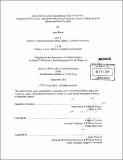| dc.contributor.advisor | Chappell Lawson. | en_US |
| dc.contributor.author | Binur, Anat | en_US |
| dc.contributor.other | Massachusetts Institute of Technology. Dept. of Political Science. | en_US |
| dc.coverage.spatial | a-is--- | en_US |
| dc.date.accessioned | 2012-01-30T17:03:29Z | |
| dc.date.available | 2012-01-30T17:03:29Z | |
| dc.date.copyright | 2011 | en_US |
| dc.date.issued | 2011 | en_US |
| dc.identifier.uri | http://hdl.handle.net/1721.1/68924 | |
| dc.description | Thesis (Ph. D.)--Massachusetts Institute of Technology, Dept. of Political Science, 2011. | en_US |
| dc.description | Cataloged from PDF version of thesis. | en_US |
| dc.description | Includes bibliographical references (p. 192-217). | en_US |
| dc.description.abstract | This dissertation seeks to deepen our understanding of intergroup relations by employing a behavioral experimental method to empirically measure intergroup norms of behavior and the motivations that drive them, within a real-world active and extremely charged conflict, the Palestinian-Israeli conflict. Specifically, I implement a large-N study using trust and dictator games with West Bank Palestinians and Israeli Jews in order to test prevalent assumptions in the literature on intergroup norms of behavior in times of conflict. The study, which was implemented in the weeks following the Gaza war, a time of high conflict saliency, goes beyond most existing research on trust and fairness between groups by empirically testing actual behavior with monetary incentives, rather than mere attitudinal statements, during an active conflict, rather than peacetime. Overall, the results of the experiments show that, when rigorously tested, intergroup norms of cooperation, trust and fairness exist even in such an extreme case as the Palestinian- Israeli conflict. Second, I found that gender plays an important role in explaining intergroup interaction. Perhaps surprisingly, the results show that men, and specifically Israeli men, are more willing to put aside ideology and compromise with Palestinians in order to ensure self-gain. Moreover, the results show that both motivations of utility maximization, on the one hand, and psychological and emotional motivations associated with the group level dynamics, on the other, drive the interaction between Palestinians and Israelis; challenging the frequent opposition of the two approaches taken by much of the political science literature. Methodologically, the research demonstrates the ways in which behavioral experimental games can complement other methods to enhance the investigation of intergroup relations as well as help develop more substantiated and effective policies aimed at ameliorating and preventing intergroup conflict. Implications of the findings for theory, methodology and policy related to intergroup conflict and cooperation are discussed. | en_US |
| dc.description.statementofresponsibility | by Anat Binur. | en_US |
| dc.format.extent | 217 p. | en_US |
| dc.language.iso | eng | en_US |
| dc.publisher | Massachusetts Institute of Technology | en_US |
| dc.rights | M.I.T. theses are protected by
copyright. They may be viewed from this source for any purpose, but
reproduction or distribution in any format is prohibited without written
permission. See provided URL for inquiries about permission. | en_US |
| dc.rights.uri | http://dspace.mit.edu/handle/1721.1/7582 | en_US |
| dc.subject | Political Science. | en_US |
| dc.title | Trust, fairness and cooperation in times of conflict : a behavioral economics approach to measuring intergroup norms of behavior in the Palestinian-Israeli conflict | en_US |
| dc.title.alternative | Behavioral economics approach to measuring intergroup norms of behavior in the Palestinian-Israeli Conflict | en_US |
| dc.type | Thesis | en_US |
| dc.description.degree | Ph.D. | en_US |
| dc.contributor.department | Massachusetts Institute of Technology. Department of Political Science | |
| dc.identifier.oclc | 773700977 | en_US |
